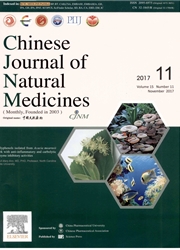

 中文摘要:
中文摘要:
Elucidation of the efficacy of traditional Chinese medicine(TCM) is of importance for scientists of modern medicine to understand the value of TCM clinical experience, and it is necessary to have a biological language to scientifically describe the efficacy of TCM. With this background,Chinmedomics has been proposed by our team, which includes integrating serum pharmacochemistry and metabolomics technology, defining theory and research methods for expressing the efficacy of TCMs based on the biomarkers discovery of TCM syndrome and elucidating the efficacy of TCM formulae, discovering effective constituents, and finally elucidating the scientific value of TCM. In the present study, the innovative chinmedomics strategy was conducted to evaluate the therapeutic effects of Shen Qi Wan(SQW) acting on Shen Yang Xu(kidney-yang deficiency syndrome, KYDS). We analyzed the urine metabolic trajectory between the model and control groups, and identified the biomarkers by the multivariate analysis. We found that SQW caused significant restoration of abnormal metabolism of KYDs. Using the method of metabolomics, 17 potential urine biomarkers were analyzed through 4 repeated tests in our serial studies on SQW and KYDS. Under the premise of therapeutic efficacy, a total of 56 peaks were tentatively characterized in vivo by the use of serum pharmacochemistry. Correlation analysis between marker metabolites and in vivo constituents of SQW showed that 28 compositions had a close relationship with urine biomarkers of therapeutic effects, whichmight play a key role in the therapeutic effect of SQW. These compounds were imported into an online database to predict their targets. Twenty-three important potential targets were identified, which were related to the metabolism of steroid hormone, tryptophan utilization, and thyroid hormone. In conclusion, chinmedomics is a useful strategy for discovery of potentially effective constituents from complex TCM formulae.
 英文摘要:
英文摘要:
Elucidation of the efficacy of traditional Chinese medicine (TCM) is of importance for scientists of modem medicine to understand the value of TCM clinical experience, and it is necessary to have a biological language to scientifically describe the efficacy of TCM. With this background, Chinmedomics has been proposed by our team, which includes integrating serum pharmacochemistry and metabolomics technology, defining theory and research methods for expressing the efficacy of TCMs based on the biomarkers discovery of TCM syndrome and elucidating the efficacy of TCM formulae, discovering effective constituents, and finally elucidating the scientific value of TCM. In the present study, the innovative chinmedomics strategy was conducted to evaluate the therapeutic effects of ShenQiWan (SQW) acting on ShenYangXu (kidney-yang deficiency syndrome, KYDS). We analyzed the urine metabolic trajectory between the model and control groups, and identified the biomarkers by the multivariate analysis. We found that SQW caused significant restoration of abnormal metabolism of KYDs. Using the method of metabolomics, 17 potential urine biomarkers were analyzed through 4 repeated tests in our serial studies on SQW and KYDS. Under the premise of therapeutic efficacy, a total of 56 peaks were tentatively characterized in vivo by the use of serum pharmacochemistry. Correlation analysis between marker metabolites and in vivo constituents of SQW showed that 28 compositions had a close relationship with urine biomarkers of therapeutic effects, whichmight play a key role in the therapeutic effect of SQW. These compounds were imported into an online database to predict their targets. Twenty-three important potential targets were identified, which were related to the metabolism of steroid hormone, tryptophan utilization, and thyroid hormone. In conclusion, chinmedomics is a useful strategy for discovery of potentially effective constituents from complex TCM formulae.
 同期刊论文项目
同期刊论文项目
 同项目期刊论文
同项目期刊论文
 Rapid identification and comparative analysis of chemical constituents and metabolites of Phellodend
Rapid identification and comparative analysis of chemical constituents and metabolites of Phellodend Chemical Discrimination of Cortex Phellodendri amurensis and Cortex Phellodendri chinensis by Multiv
Chemical Discrimination of Cortex Phellodendri amurensis and Cortex Phellodendri chinensis by Multiv Rapid discovery and global characterization of chemical constituents and rats metabolites of Phellod
Rapid discovery and global characterization of chemical constituents and rats metabolites of Phellod Identification and characterization of the chemical constituents of Simiao Wan by ultra high perform
Identification and characterization of the chemical constituents of Simiao Wan by ultra high perform Fingerprinting and simultaneous determination of alkaloids and limonins in Phellodendri amurensis co
Fingerprinting and simultaneous determination of alkaloids and limonins in Phellodendri amurensis co 期刊信息
期刊信息
